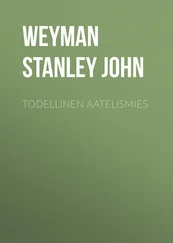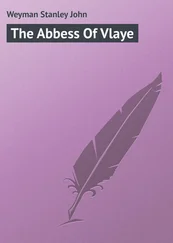Stanley Weyman - The Red Cockade
Здесь есть возможность читать онлайн «Stanley Weyman - The Red Cockade» — ознакомительный отрывок электронной книги совершенно бесплатно, а после прочтения отрывка купить полную версию. В некоторых случаях можно слушать аудио, скачать через торрент в формате fb2 и присутствует краткое содержание. Жанр: foreign_prose, на английском языке. Описание произведения, (предисловие) а так же отзывы посетителей доступны на портале библиотеки ЛибКат.
- Название:The Red Cockade
- Автор:
- Жанр:
- Год:неизвестен
- ISBN:нет данных
- Рейтинг книги:4 / 5. Голосов: 1
-
Избранное:Добавить в избранное
- Отзывы:
-
Ваша оценка:
- 80
- 1
- 2
- 3
- 4
- 5
The Red Cockade: краткое содержание, описание и аннотация
Предлагаем к чтению аннотацию, описание, краткое содержание или предисловие (зависит от того, что написал сам автор книги «The Red Cockade»). Если вы не нашли необходимую информацию о книге — напишите в комментариях, мы постараемся отыскать её.
The Red Cockade — читать онлайн ознакомительный отрывок
Ниже представлен текст книги, разбитый по страницам. Система сохранения места последней прочитанной страницы, позволяет с удобством читать онлайн бесплатно книгу «The Red Cockade», без необходимости каждый раз заново искать на чём Вы остановились. Поставьте закладку, и сможете в любой момент перейти на страницу, на которой закончили чтение.
Интервал:
Закладка:
"You have heard?"
"Buton told me."
"What? Is he here?" I said in surprise. "I saw him at Cahors less than three hours ago."
"Such news gives a man wings," Father Benôit answered with energy. "I say again, it has come. It has come, M. le Vicomte."
"Something," I said prudently.
"Everything," he answered confidently. "The mob took the Bastille, but who headed them? The soldiers; the Garde Française. Well, M. le Vicomte, if the army cannot be trusted, there is an end of abuses, an end of exemptions, of extortions, of bread famines, of Foulons and Berthiers, of grinding the faces of the poor, of-"
The Curé's list was not half exhausted when I cut it short. "But if the army is with the mob, where will things stop?" I said wearily.
"We must see to that," he answered.
"Come and sup with me," I said, "I have something to tell you, and more to ask you."
He assented gladly. "For there will be no sleep for me to-night," he said, his eye sparkling. "This is great news, glorious news, M. le Vicomte. Your father would have heard it with joy."
"And M. de Launay?" I said as I dismounted.
"There can be no change without suffering," he answered stoutly, though his face fell a little. "His fathers sinned, and he has paid the penalty. But God rest his soul! I have heard that he was a good man."
"And died in his duty," I said rather tartly.
"Amen," Father Benôit answered.
Yet it was not until we were sat down in the Chestnut Parlour (which the servants called the English Room), and, with candles between us, were busy with our cheese and fruit, that I appreciated to the full the impression which the news had made on the Curé. Then, as he talked, as he told and listened, his long limbs and lean form trembled with excitement; his thin face worked. "It is the end," he said. "You may depend upon it, M. le Vicomte, it is the end. Your father told me many times that in money lay the secret of power. Money, he used to say, pays the army, the army secures all. A while ago the money failed. Now the army fails. There is nothing left."
"The King?" I said, unconsciously quoting Madame la Marquise.
"God bless his Majesty!" the Curé answered heartily. "He means well, and now he will be able to do well, because the nation will be with him. But without the nation, without money or an army-a name only. And the name did not save the Bastille."
Then, beginning with the scene at Madame de St. Alais' reception, I told him all that had happened to me; the oath of the sword, the debate in the Assembly, the tumult in the Square-last of all, the harsh words with which Madame had given me my congé ; all. As he listened he was extraordinarily moved. When I described the scene in the Chamber, he could not be still, but in his enthusiasm, walked about the parlour, muttering. And, when I told him how the crowd had cried " Vive Saux! " he repeated the words softly and looked at me with delighted eyes. But when I came-halting somewhat in my speech, and colouring and playing with my bread to hide my disorder-to tell him my thoughts on the way home, and the choice that, as it seemed to me, was offered to me, he sat down, and fell also to crumbling his bread and was silent.
CHAPTER V.
THE DEPUTATION
He sat silent so long, with his eyes on the table, that presently I grew nettled; wondering what ailed him, and why he did not speak and say the things that I expected. I had been so confident of the advice he would give me, that, from the first, I had tinged my story with the appropriate colour. I had let my bitterness be seen; I had suppressed no scornful word, but supplied him with all the ground he could desire for giving me the advice I supposed to be upon his lips.
And yet he did not speak. A hundred times I had heard him declare his sympathy with the people, his hatred of the corruption, the selfishness, the abuses of the Government; within the hour I had seen his eye kindle as he spoke of the fall of the Bastille. It was at his word I had burned the carcan ; at his instance I had spent a large sum in feeding the village during the famine of the past year. Yet now-now, when I expected him to rise up and bid me do my part, he was silent!
I had to speak at last. "Well?" I said irritably. "Have you nothing to say, M. le Curé?" And I moved one of the candles so as to get a better view of his features. But he still looked down at the table, he still avoided my eye, his thin face thoughtful, his hand toying with the crumbs.
At last, "M. le Vicomte," he said softly, "through my mother's mother I, too, am noble."
I gasped; not at the fact with which I was familiar, but at the application I thought he intended. "And for that," I said amazed, "you would-"
He raised his hand to stop me. "No," he said gently, "I would not. Because, for all that, I am of the people by birth, and of the poor by my calling. But-"
"But what?" I said peevishly.
Instead of answering me he rose from his seat, and, taking up one of the candles, turned to the panelled wall behind him, on which hung a full-length portrait of my father, framed in a curious border of carved foliage. He read the name below it. "Antoine du Pont, Vicomte de Saux," he said, as if to himself. "He was a good man, and a friend to the poor. God keep him."
He lingered a moment, gazing at the grave, handsome face, and doubtless recalling many things; then he passed, holding the candle aloft, to another picture which flanked the table: each wall boasted one. "Adrien du Pont, Vicomte de Saux," he read, "Colonel of the Regiment Flamande. He was killed, I think, at Minden. Knight of St. Louis and of the King's Bedchamber. A handsome man, and doubtless a gallant gentleman. I never knew him."
I answered nothing, but my face began to burn as he passed to a third picture behind me. "Antoine du Pont, Vicomte de Saux," he read, holding up the candle, "Marshal and Peer of France, Knight of the King's Orders, a Colonel of the Household and of the King's Council. Died of the plague at Genoa in 1710. I think I have heard that he married a Rohan."
He looked long, then passed to the fourth wall, and stood a moment quite silent. "And this one?" he said at last. "He, I think, has the noblest face of all. Antoine, Seigneur du Pont de Saux, of the Order of St. John of Jerusalem, Preceptor of the French tongue. Died at Valetta in the year after the Great Siege-of his wounds, some say; of incredible labours and exertions, say the Order. A Christian soldier."
It was the last picture, and, after gazing at it a moment, he brought the candle back and set it down with its two fellows on the shining table; that, with the panelled walls, swallowed up the light, and left only our faces white and bright, with a halo round them, and darkness behind them. He bowed to me. "M. le Vicomte," he said at last, in a voice which shook a little, "you come of a noble stock."
I shrugged my shoulders. "It is known," I said. "And for that?"
"I dare not advise you."
"But the cause is good!" I cried.
"Yes," he answered slowly. "I have been saying so all my life. I dare not say otherwise now. But-the cause of the people is the people's. Leave it to the people."
" You say that!" I answered, staring at him, angry and perplexed. "You, who have told me a hundred times that I am of the people! that the nobility are of the people; that there are only two things in France, the King and the people."
He smiled somewhat sadly; tapping on the table with his fingers. "That was theory," he said. "I try to put it into practice, and my heart fails me. Because I, too, have a little nobility, M. le Vicomte, and know what it is."
"I don't understand you," I said in despair. "You blow hot and cold, M. le Curé. I told you just now that I spoke for the people at the meeting of the noblesse, and you approved."
Читать дальшеИнтервал:
Закладка:
Похожие книги на «The Red Cockade»
Представляем Вашему вниманию похожие книги на «The Red Cockade» списком для выбора. Мы отобрали схожую по названию и смыслу литературу в надежде предоставить читателям больше вариантов отыскать новые, интересные, ещё непрочитанные произведения.
Обсуждение, отзывы о книге «The Red Cockade» и просто собственные мнения читателей. Оставьте ваши комментарии, напишите, что Вы думаете о произведении, его смысле или главных героях. Укажите что конкретно понравилось, а что нет, и почему Вы так считаете.












